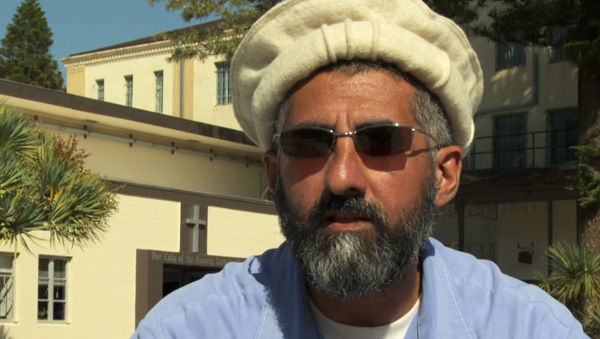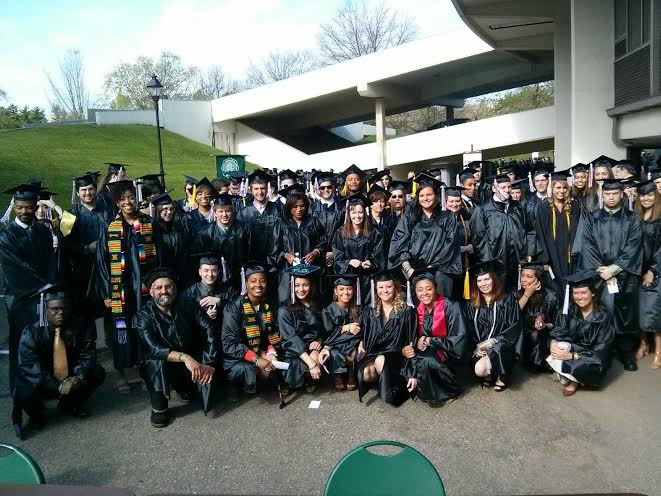From the D.O.C. to Doc: The Role of Education in My Incarceration
Published by: WCET | 6/4/2014
Published by: WCET | 6/4/2014
Deb Gearhart, Ohio University, recently told me the inspiring story of one of their distance graduates who overcame several life challenges on his road to a degree. After several youthful bad decisions, this student was sentenced to life imprisonment through California’s three-strike rule. We are very pleased that this student has agreed to share his story about how he turned his life around and the role of education in his journey. Inspiring!
Russ Poulin
Undoubtedly, amongst the most amazing sights to behold upon entering San Quentin State Prison are the randomly scattered, too high and remote to displace, wildflowers growing out of the cold, hard and otherwise desolate granite boulders that make up the seemingly impregnable perimeter walls. A casual observer may easily miss these or mistake them for something less significant, but a discerning eye, born of familiarity with such wonders, will see them for what they truly are: Life in spite of…
My story is an embodiment of that natural phenomenon: the aspiration of tiny seeds taking root in the most hopeless circumstances, against all odds, and endeavoring to bear fruit.

When I, as a young man, went to prison with a twenty-five to life sentence, I resolved to convince myself that I would never again have an opportunity to matter – to be of any importance to anyone, that I should be content with spending the rest of my life in a cage. For several years I sought refuge in this newly carved niche of hopelessness and despondency, even gaining a perverse sense of succor from it. But then, almost miraculously, some seeds of wisdom were planted and – with education providing the proper nourishment – my sense of self-worth and efficacy evolved from one of obscurity (in every sense of its Latin origin) to one of hope and awareness. I’ve been pursuing higher education ever since.
I have come to believe in the redemptive power of education:
This education helped me realize my own human potential and gave me the wherewithal to maximize it, making me a force multiplier for effectuating change in others. Indeed, for the duration of my seventeen years in prison, I either stood in front of a white board and taught or was preoccupied with benefiting from the instruction of others. Even when we did not have boards, markers, or classroom access – having to convene on the yard in less than ideal weather, we persevered.
Having seen and felt the impact of knowledge, I could not now go back to a state of ignorance. But it was not always this way.
The experiences and circumstances of my youth – which would inevitably predispose me to a life of crime and incarceration – were for so long predicated on a profound sense of ignorance. This lack of education, once it takes hold, has debilitating effects on the people: socio-economic conditions are weakened, access to resources is diminished, and establishment of preventative measures (which could have inoculated against the impending malady of drugs, gangs, and violence) become unattainable.
The natural corollary for this fatalistic condition was not only crime, but also an addition to that destructive criminal lifestyle which seemed to be the panacea for all afflictions, a respite from the doldrums. My life had devolved to such a point in this situation that I would find the gates of prison welcoming me while still a teenager. Having not learned the lessons therein, I would – less than two years after release – find my way back to that very dungeon; this time with a life sentence.
This time would be different though. This time I would meet volunteers who came into prison every day to teach us. This time I would see the impact of education on a people who lacked it for so long. This time I would be surrounded by a caring people, a people who only cared to serve the greater good. This time I would see the essence and embodiment of altruism, of helping others realize their best. Having witnessed this example of magnanimity, having been cultivated by it, I would never be the same again.
Whereas before my conduct was based on a predetermined archetypical behavioral model – defined by the criminal lifestyle, a model that used the example of power as a means to garner influence, I now saw the world through a completely different lens. I saw the world as a hopeful place, a place where so many could be impelled to do better just by coinciding with an example of goodness. I would come to believe for all times that it is not the example of power, but rather the power of the example that wins the day.
My incarceration thereafter is replete with instances of living up to this example of selfless service to others: I taught a formal G.E.D. preparatory class, tutored in adult basic education, started five self-help groups, created the curricula for these groups, facilitated the daily discussion groups, taught Islamic studies, participated in gang intervention symposiums, started gang intervention groups, and gave back in ways that I couldn’t even fathom when I first entered prison.

I enrolled in college with my own hard earned money from prison labor and sacrificed until I finally earned the Bachelor’s Degree from The Ohio University through its correspondence program aimed at serving incarcerated students. In fact, it was because of this degree and this new-found belief in exploring and maximizing human potential, a belief founded on and reinforced with education, that I was able to eventually secure my own freedom; a freedom that I could not have ever envisioned.
Shortly after release, I was accepted into the PhD program at the Western Institute for Social Research. I am not only employed as a teacher at a non-profit, which establishes educational programs for prisoners, but also plan on working with other non-profits and our elected officials to bring attention to the issues that affect the incarcerated.
Whether it is the causative or contributory factors that facilitate incarceration, or that predispose some to recidivate after release, I intend to study these at the grad level and work collaboratively with others to find meaningful solutions. My doctorate will be not only in service of those who need it the most, but also a testament to the transformative power of education. I will have proven that an investment in education can take a person from the Department of Corrections (D.O.C.) to being a doctor.
It was a discerning eye that saw the seedling that pushed through the granite boulders in spite of everything designed to hold it back. It will take more discerning eyes to help it grow. It will take more helping hands to nurture those seedlings so they spawn other seedlings. Eventually, the overwhelming volume and force can cover the prison walls and growing roots that are strong enough to tear those walls down.
We must have that discerning eye. We must have those helping hands. We can matter in their lives so their lives can matter.
Sajad Shakoor
Ohio University
Class of 2014